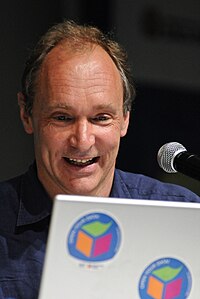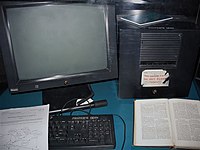Tim Berners-Lee
From Wikipedia, the free encyclopedia
| Tim Berners-Lee | |
 Tim Berners-Lee at Campus Party Brasil 2009, photo by Silvio Tanaka.
|
|
| Born | 8 June 1955 London[1] |
|---|---|
| Other names | Tim [2] |
| Education | The Queen's College, Oxford |
| Occupation | Computer Scientist |
| Employer | World Wide Web Consortium and University of Southampton |
| Known for | Inventing the World Wide Web |
| Title | Senior Researcher |
| Religious beliefs | Unitarian Universalism |
| Spouse(s) | Nancy Carlson (remarried) |
| Children | 2 |
| Parents | Conway Berners-Lee and Mary Lee Woods |
| Website Tim Berners-Lee |
|
|
Notes
Holder of the 3Com Founders Chair at MIT's Computer Science and Artificial Intelligence Laboratory
|
|
Sir Timothy John Berners-Lee, OM, KBE, FRS, FREng, FRSA (London, 8 June 1955) is an English computer scientist and MIT professor credited with inventing the World Wide Web. On 25 December 1990 he implemented the first successful communication between an HTTP client and server via the Internet with the help of Robert Cailliau and a young student staff at CERN. He was ranked Joint First alongside Albert Hofmann in The Telegraph's list of 100 greatest living geniuses.[3] Berners-Lee is the director of the World Wide Web Consortium (W3C), which oversees the Web's continued development, the founder of the World Wide Web Foundation and he is a senior researcher and holder of the 3Com Founders Chair at the MIT Computer Science and Artificial Intelligence Laboratory (CSAIL).[4]
Contents |
[edit] Early life
Tim Berners-Lee was born in London, England on 8 June 1955. He attended Emanuel School in London from 1969 to 1973, and studied at The Queen's College, Oxford University, from 1973 to 1976, where he received his BA Hons (I) in Physics.[1]
[edit] Career
While an independent contractor at CERN from June to December 1980, Berners-Lee proposed a project based on the concept of hypertext, to facilitate sharing and updating information among researchers.[5] While there, he built a prototype system named ENQUIRE. After leaving CERN in 1980 he went to work at John Poole's Image Computer Systems Ltd in Bournemouth but returned to CERN in 1984 as a fellow. In 1989, CERN was the largest Internet node in Europe, and Berners-Lee saw an opportunity to join hypertext with the Internet: "I just had to take the hypertext idea and connect it to the Transmission Control Protocol and domain name system ideas and — ta-da! — the World Wide Web."[6] He wrote his initial proposal in March 1989, and in 1990, with the help of Robert Cailliau, produced a revision which was accepted by his manager, Mike Sendall. He used similar ideas to those underlying the Enquire system to create the World Wide Web, for which he designed and built the first web browser and editor (WorldWideWeb, running on the NeXTSTEP operating system) and the first Web server, CERN HTTPd (short for HyperText Transfer Protocol daemon).
The first Web site built was at CERN[7][8][9][10] and was first put online on 6 August 1991. It provided an explanation about what the World Wide Web was, how one could own a browser and how to set up a Web server. It was also the world's first Web directory, since Berners-Lee maintained a list of other Web sites apart from his own.
In 1994, Berners-Lee founded the World Wide Web Consortium (W3C) at the Massachusetts Institute of Technology. It comprised various companies that were willing to create standards and recommendations to improve the quality of the Web. Berners-Lee made his idea available freely, with no patent and no royalties due. The World Wide Web Consortium decided that their standards must be based on royalty-free technology, so they can be easily adopted by anyone.[11]
In 2001, Berners-Lee became a patron of the East Dorset Heritage Trust having previously lived in Colehill in Wimborne, East Dorset, England.
In December 2004 he accepted a chair in Computer Science at the School of Electronics and Computer Science, University of Southampton, England, to work on his new project—the Semantic Web.[12]
He was also one of the pioneer voices in favour of Net Neutrality.[13]
He feels that ISPs should not intercept customers' browsing activities, and has such strong views about this that he would change ISPs to get away from such activities.[14][15]
Berners-Lee is currently the Director of the W3C and also at the Massachusetts Institute of Technology the 3Com Founders Professor in the School of Engineering and at the Computer Science and Artificial Intelligence Laboratory (MIT CSAIL). He is also a director of The Web Science Research Initiative (WSRI),[16] and a member of the advisory board of the MIT Center for Collective Intelligence.[17][18]
[edit] Recognition
| Millennium Technology Prize winner | |
| Year awarded | 2004 |
|---|---|
| Invention | World Wide Web |
| Prize presented by | Tarja Halonen |
| Previous laureate | First recipient, no previous laureates |
| Following laureate | Shuji Nakamura |
- In 2003, he received the Computer History Museum's Fellow Award for his seminal contributions to the development of the World Wide Web.[19]
- On 15 April, 2004 he was named as the first recipient of Finland's Millennium Technology Prize for inventing the World Wide Web. The cash prize, worth one million euros (about £881,000 or USD$1.3 million (at the current[when?] exchange rate)), was awarded on 15 June, in Helsinki, Finland by President of the Republic of Finland, Tarja Halonen.[20]
- He was given the rank of Knight Commander (the second-highest rank in the Order of the British Empire) by Queen Elizabeth II as part of the 2004 New Year's Honours and was invested on 16 July, 2004.[21][22]
- On 21 July 2004 he was presented with the degree of Doctor of Science (honoris causa) from Lancaster University.[23]
- On 27 January 2005 he was named Greatest Briton of 2004 for his achievements as well as displaying the key British characteristics of "diffidence, determination, a sharp sense of humour and adaptability" as put by David Hempleman-Adams, a panel member.[24] Time Magazine included Berners-Lee in its list of the 100 most influential people of the 20th century, published in 1999.
- On 13 June 2007 he received the Order of Merit, a personal gift from Queen Elizabeth II where ministerial advice is not required, becoming one of only 24 living members entitled to hold the award and use 'OM' after their name.[25]
- On 20 September 2008 he was awarded the IEEE/RSE Wolfson James Clerk Maxwell Award for conceiving and further developing the World Wide Web IEEE[26]
[edit] Personal life
Berners-Lee left the Church of England, a religion in which he had been brought up, as a teenager just after being confirmed because he could not "believe in all kinds of unbelievable things." He and his family eventually found a Unitarian Universalist church while they were living in Boston.[27]
[edit] See also
[edit] Publications
- Berners-Lee, Tim; Mark Fischetti (1999). Weaving the Web: Origins and Future of the World Wide Web. Britain: Orion Business. ISBN 0-7528-2090-7.
[edit] Notes
- ^ a b Berners-Lee biography at the World Wide Web Consortium
- ^ http://www.w3.org/People/Berners-Lee/
- ^ http://www.telegraph.co.uk/news/uknews/1567544/Top-100-living-geniuses.html
- ^ "Draper Prize". Massachusetts Institute of Technology. http://web.mit.edu/newsoffice/2007/draper-prize.html. Retrieved on 2008-05-25.
- ^ "Berners-Lee's original proposal to CERN". World Wide Web Consortium. March 1989. http://www.w3.org/History/1989/proposal.html. Retrieved on 2008-05-25.
- ^ Berners-Lee, Tim. "Answers for Young People". World Wide Web Consortium. http://www.w3.org/People/Berners-Lee/Kids. Retrieved on 2008-05-25.
- ^ "Welcome to info.cern.ch, the website of the world's first-ever web server". CERN. http://info.cern.ch/. Retrieved on 2008-05-25.
- ^ "World Wide Web — Archive of world's first website". World Wide Web Consortium. http://www.w3.org/History/19921103-hypertext/hypertext/WWW/TheProject.html. Retrieved on 2008-05-25.
- ^ "World Wide Web — First mentioned on USENET". Google. 1991-08-06. http://groups.google.co.uk/group/alt.hypertext/msg/06dad279804cb3ba?dmode=source&hl=en. Retrieved on 2008-05-25.
- ^ "The original post to alt.hypertalk describing the WorldWideWeb Project". Google. 1991-08-09. http://groups.google.com/group/comp.archives/browse_thread/thread/9fb079523583d42/37bb6783d03a3b0d?lnk=st&q=&rnum=2&hl=en#37bb6783d03a3b0d. Retrieved on 2008-05-25.
- ^ "Patent Policy - 5 February 2004". World Wide Web Consortium. 2004-02-05. http://www.w3.org/Consortium/Patent-Policy-20040205/. Retrieved on 2008-05-25.
- ^ "Tim Berners-Lee, World Wide Web inventor, to join ECS". World Wide Web Consortium. 2004-12-02. http://www.ecs.soton.ac.uk/news/658. Retrieved on 2008-05-25.
- ^ "Web creator rejects net tracking". BBC. 15 September 2008. http://news.bbc.co.uk/2/hi/technology/7613201.stm. Retrieved on 2008-09-15. "Warning sounded on web's future ."
- ^ "Web creator rejects net tracking". BBC. March 2008. http://news.bbc.co.uk/1/hi/technology/7299875.stm. Retrieved on 2008-05-25. "Sir Tim rejects net tracking like Phorm."
- ^ "Web inventor's warning on spy software". Telegraph. March 2008. http://www.telegraph.co.uk/news/uknews/1581938/Web-inventor%27s-warning-on-spy-software.html. Retrieved on 2008-05-25. "Sir Tim rejects net tracking like Phorm."
- ^ [1]
- ^ MIT Center for Collective Intelligence (homepage)
- ^ MIT Center for Collective Intelligence (people)
- ^ [2]
- ^ "Millennium Technology Prize 2004 awarded to inventor of World Wide Web". Millennium Technology Prize. Archived from the original on 2007-08-30. http://web.archive.org/web/20070830111145/http://www.technologyawards.org/index.php?m=2&s=1&id=16&sm=4. Retrieved on 2008-05-25.
- ^ "Web's inventor gets a knighthood". BBC. 2003-12-31. http://news.bbc.co.uk/1/hi/technology/3357073.stm. Retrieved on 2008-05-25.
- ^ "Creator of the web turns knight". BBC. 2004-07-16. http://news.bbc.co.uk/1/hi/technology/3899723.stm. Retrieved on 2008-05-25.
- ^ "Lancaster University Honorary Degrees, July 2004". Lancaster University. http://domino.lancs.ac.uk/info/lunews.nsf/I/2768F56EB38B32F780256ECC00404E69. Retrieved on 2008-05-25.
- ^ "Three loud cheers for the father of the web". The Telegraph. 2005-01-28. http://www.telegraph.co.uk/news/uknews/1482211/Three-loud-cheers-for-the-father-of-the-web.html. Retrieved on 2008-05-25.
- ^ "Web inventor gets Queen's honour". BBC. 2007-06-13. http://news.bbc.co.uk/1/hi/technology/6750395.stm. Retrieved on 2008-05-25.
- ^ Timothy Berners-Lee IEEE/RSE Wolfson James Clerk Maxwell Award 2008. Accessed 11 Nov 2008.
- ^ Berners-Lee, Timothy (1998). WWW "The World Wide Web and the "Web of Life"". World Wide Web Consortium. http://www.w3.org/People/Berners-Lee/UU.htmlWWW. Retrieved on 2008-05-25.
[edit] Further reading
- Tim Berners-Lee and the Development of the World Wide Web (Unlocking the Secrets of Science) Ann Gaines (Mitchell Lane Publishers, 2001) ISBN 1-58415-096-3
- Tim Berners-Lee: Inventor of the World Wide Web (Ferguson's Career Biographies) Melissa Stewart (Ferguson Publishing Company, 2001) ISBN 0-89434-367-X children's biography
- Weaving the Web Berners-Lee, Tim with Fischetti, Mark (Harper Collins Publishers,1999) ISBN 0-06-251586-1(cloth) ISBN 0-06-251587-X(paper)
- How the Web was Born: The Story of the World Wide Web Robert Cailliau, James Gillies, R. Cailliau (Oxford University Press, 2000) ISBN 0-19-286207-3
- School of Electronics and Computer Science at the University of Southampton
- BBC2 Newsnight – Video interview clip of Berners-Lee on the read/write Web[dead link]
- Technology Review interview
[edit] External links
|
||||||||||||||||||||



